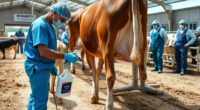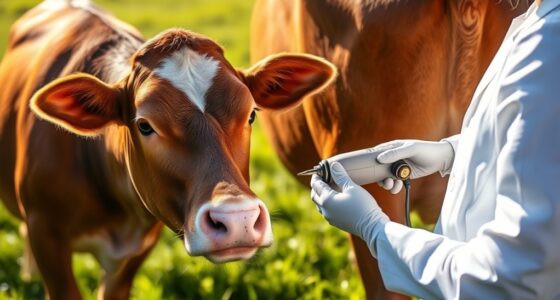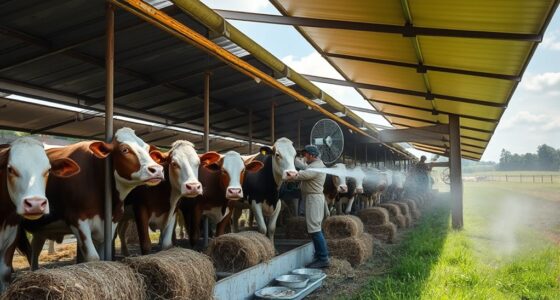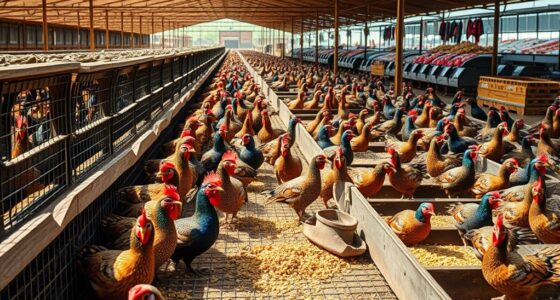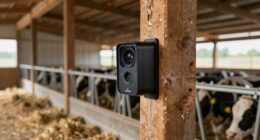To prevent African Swine Fever, you should strengthen farm biosecurity by controlling access, disinfecting equipment, and enforcing strict hygiene practices for visitors and workers. Keep wild animals away and secure your farm with proper fencing. Regularly clean pens and transport vehicles, and monitor pigs daily for symptoms like fever or loss of appetite. Immediate isolation and prompt reporting are vital. Staying vigilant and implementing these measures can considerably reduce your risk — keep going to explore more effective prevention strategies.
Key Takeaways
- Implement strict biosecurity measures, including controlling access and disinfecting equipment and personnel.
- Regularly clean and disinfect pig pens, feeding tools, and transportation vehicles.
- Keep wild animals, stray pigs, and birds away from the farm to prevent virus introduction.
- Monitor pigs daily for symptoms like fever, skin hemorrhages, and sudden death for early detection.
- Promote community awareness and collaboration to strengthen prevention and rapid response efforts.
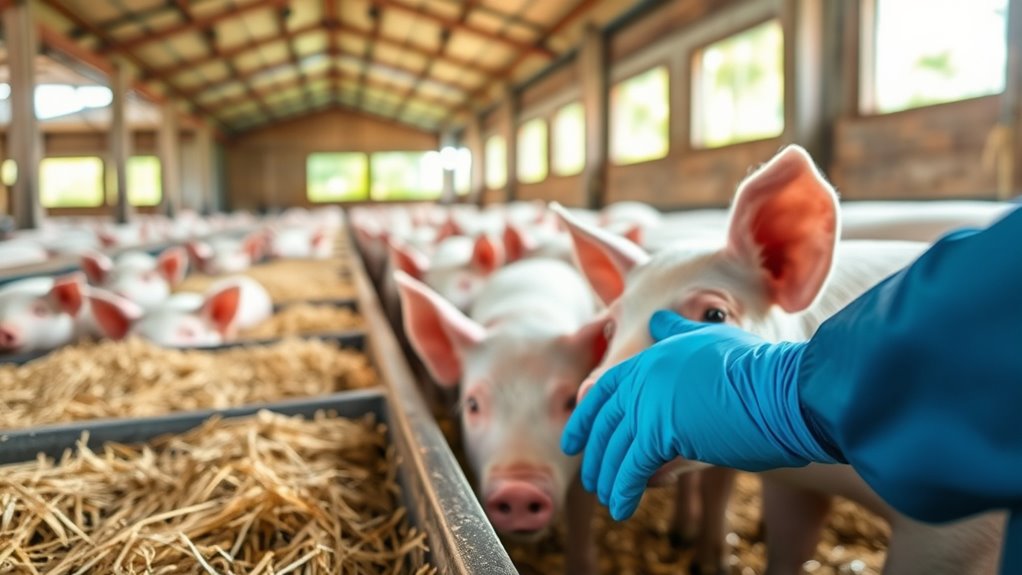
Have you ever wondered what African Swine Fever is and why it’s causing so much concern worldwide? This highly contagious disease affects pigs, with no effective vaccine or treatment available. It spreads rapidly, causing severe illness and high mortality rates, which threaten the pig farming industry globally. As a pig farmer, understanding how to prevent its spread starts with implementing strict biosecurity measures and emphasizing early detection. These strategies are your first line of defense against this devastating disease.
Biosecurity measures are essential in safeguarding your farm. They include everything from controlling access points to disinfecting equipment and personnel. When visitors or workers come onto your farm, make sure they follow strict hygiene protocols, such as changing footwear and clothing or disinfecting hands and tools. Keeping stray animals, wild pigs, or birds away from your pigs reduces potential contact with the virus. Proper fencing and secure housing also limit the chances of transmission from outside sources. Regularly cleaning and disinfecting pens, feeding equipment, and transportation vehicles helps eliminate any traces of the virus and prevents its spread within your farm. These measures may seem simple, but they are highly effective in creating a barrier against infection. Additionally, understanding the role of community involvement can enhance the effectiveness of biosecurity efforts, as collective vigilance helps prevent outbreaks.
Implement strict biosecurity with hygiene, fencing, and cleaning to protect your farm from African Swine Fever.
Early detection plays a pivotal role in controlling African Swine Fever. Recognize the signs early—such as high fever, loss of appetite, skin hemorrhages, and sudden death. Monitoring your pigs daily allows you to spot symptoms quickly and respond immediately. If you notice any unusual behaviors or health issues, isolate affected animals from the herd right away. Prompt diagnosis is essential because the sooner you identify the disease, the better your chances of preventing an outbreak. Reporting suspicious cases to veterinary authorities without delay helps contain the disease and protects your farm and the wider pig community.
Combining rigorous biosecurity measures with vigilant monitoring for early signs of illness creates a strong defense against African Swine Fever. Remember, prevention is always better than dealing with the consequences of an outbreak, which can be devastating both financially and emotionally. Staying informed about the latest biosecurity protocols and working closely with veterinary professionals will help you stay ahead of the disease. Ultimately, your proactive efforts can make a significant difference in safeguarding your pigs and maintaining the health of your farm.
Frequently Asked Questions
Can African Swine Fever Infect Wild Boars?
Yes, African Swine Fever can infect wild boars. Wild boar transmission occurs through direct contact with infected animals or environmental contamination, such as contaminated feed, water, or soil. These animals can spread the virus to domestic pigs or other wild boars, making it essential to monitor and control wild boar populations. Preventing environmental contamination and limiting contact between wild boars and farmed pigs help reduce infection risks.
Are There Effective Vaccines for African Swine Fever?
Currently, there are no effective vaccines for African Swine Fever, despite extensive vaccine research. About 80% of vaccine candidates fail during development, highlighting the challenge. You should focus on strict biosecurity measures, as vaccines haven’t proven reliable yet. Future vaccine development aims to stimulate a strong immune response, but for now, prevention relies on controlling the disease’s spread through hygiene and strict farm management.
How Long Can the Virus Survive Outside a Pig?
The African swine fever virus can survive outside pigs for weeks to months, depending on environmental conditions. Its persistence is influenced by factors like temperature, humidity, and surface type, which affect its environmental stability. Cooler, moist environments tend to support longer virus survival, making it essential for pig farmers to thoroughly disinfect equipment and facilities after potential contamination. This helps prevent virus persistence and reduces infection risks.
What Are the Economic Impacts of an Outbreak?
An outbreak can devastate your farm with staggering economic loss and market disruption, threatening your entire livelihood. You might lose countless pigs overnight, leaving your business in ruins. Prices could plummet, making it impossible to sell your pigs or pork products. The financial strain can be overwhelming, forcing you to close your farm. Protecting against African Swine Fever isn’t just smart—it’s essential to safeguard your future from catastrophic economic devastation.
Is ASF Contagious Through Pork Products?
Yes, ASF can spread through pork product transmission. If contaminated pork products are handled or fed to pigs, the virus can infect them, especially if proper cooking or processing isn’t followed. Contamination risks increase when pork products come into contact with pig environments or feed. To prevent outbreaks, always make certain pork products are thoroughly cooked and avoid feeding raw or undercooked pork to your pigs.
Conclusion
By staying vigilant and practicing strict biosecurity, you can keep African Swine Fever at bay. Imagine your healthy pigs frolicking freely in a clean, safe pen, their lively movements a sign of well-being. Every precaution you take paints a shield of protection around your herd, turning a threatening shadow into a distant memory. With careful prevention, you ensure your pigs thrive, and your farm remains a vibrant, bustling haven of life and prosperity.


